Formal consultations regarding the deployment of U.S. missile defense system THAAD on the Korean peninsula are scheduled to take place, according to the Defense Department. Photo courtesy of U.S. Department of Defense
WASHINGTON, Feb. 9 (UPI) -- The United States and South Korea are relaying conflicting messages regarding the deployment of Terminal High Altitude Area Defense on the Korean peninsula.
In a recent interview with CBS' Gayle King, President Barack Obama said the United States is "consulting with the South Koreans for the first time about more missile defense capabilities to prevent any possibility that North Korea could reach U.S. facilities or U.S. populations," a statement that reflected the concern and sense of urgency in Washington regarding North Korea in the wake of its satellite launch on Saturday.
In a separate statement, Defense Department spokesman Peter Cook said "formal consultation" is to take place between the United States and South Korea officials, to "explore the feasibility of THAAD deploying to and operating on the Korean peninsula at the earliest possible date."
But in Seoul on Tuesday a source at South Korea's Defense Ministry said the prospect of THAAD deployment was never discussed and denied reports that claimed THAAD would be deployed as early as the next coming weeks, South Korean television network SBS reported.
Deployment would only come after a careful consideration of the need for THAAD and its effectiveness in deterring North Korean missiles, the source said.
Another Defense Ministry official said a U.S.-South Korea joint working group is responsible for negotiating the terms of agreement and that actual deployment would not occur for at least two to three years, Yonhap reported.
The issue of deployment is of serious concern for China – as Beijing is concerned the system could be used for regional surveillance. Chinese Vice Minister of Foreign Affairs Liu Zhenmin has previously called in the South Korean ambassador to Beijing to formally lodge a complaint about U.S. and South Korea discussions of THAAD.
China's state-owned news agency Xinhua issued an editorial Monday criticizing U.S. policy and what it called the United States' "self-interested 'Pivot to Asia.'" China said the policy ignores international community standards.















